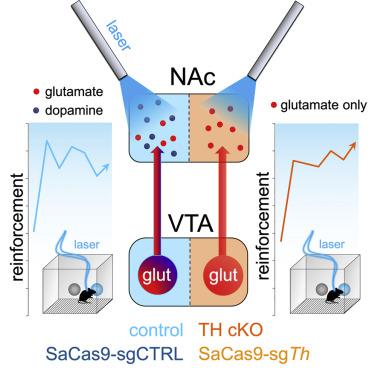Neuron ( IF 14.7 ) Pub Date : 2020-06-30 , DOI: 10.1016/j.neuron.2020.06.011 Vivien Zell 1 , Thomas Steinkellner 1 , Nick G Hollon 2 , Shelley M Warlow 1 , Elizabeth Souter 1 , Lauren Faget 1 , Avery C Hunker 3 , Xin Jin 2 , Larry S Zweifel 3 , Thomas S Hnasko 4

|
Like ventral tegmental area (VTA) dopamine (DA) neurons, VTA glutamate neuron activity can support positive reinforcement. However, a subset of VTA neurons co-release DA and glutamate, and DA release might be responsible for behavioral reinforcement induced by VTA glutamate neuron activity. To test this, we used optogenetics to stimulate VTA glutamate neurons in which tyrosine hydroxylase (TH), and thus DA biosynthesis, was conditionally ablated using either floxed Th mice or viral-based CRISPR/Cas9. Both approaches led to loss of TH expression in VTA glutamate neurons and loss of DA release from their distal terminals in nucleus accumbens (NAc). Despite loss of the DA signal, optogenetic activation of VTA glutamate cell bodies or axon terminals in NAc was sufficient to support reinforcement. These results suggest that glutamate release from VTA is sufficient to promote reinforcement independent of concomitant DA co-release, establishing a non-DA mechanism by which VTA activity can support reward-seeking behaviors.
中文翻译:

VTA 谷氨酸神经元活动驱动正强化,缺乏多巴胺共同释放。
与腹侧被盖区 (VTA) 多巴胺 (DA) 神经元一样,VTA 谷氨酸神经元活动可以支持正强化。然而,VTA 神经元的一个子集共同释放 DA 和谷氨酸,而 DA 的释放可能是 VTA 谷氨酸神经元活动诱导的行为强化的原因。为了测试这一点,我们使用光遗传学刺激 VTA 谷氨酸神经元,其中使用 floxed Th小鼠或基于病毒的 CRISPR/Cas9 有条件地消除酪氨酸羟化酶 (TH),从而消除 DA 生物合成。这两种方法都会导致 VTA 谷氨酸神经元 TH 表达丧失,并导致伏隔核 (NAc) 远端 DA 释放丧失。尽管失去了 DA 信号,NAc 中 VTA 谷氨酸细胞体或轴突末端的光遗传学激活足以支持强化。这些结果表明,VTA 释放的谷氨酸足以促进强化,独立于伴随的 DA 共同释放,建立一种非 DA 机制,通过该机制 VTA 活动可以支持寻求奖励的行为。











































 京公网安备 11010802027423号
京公网安备 11010802027423号